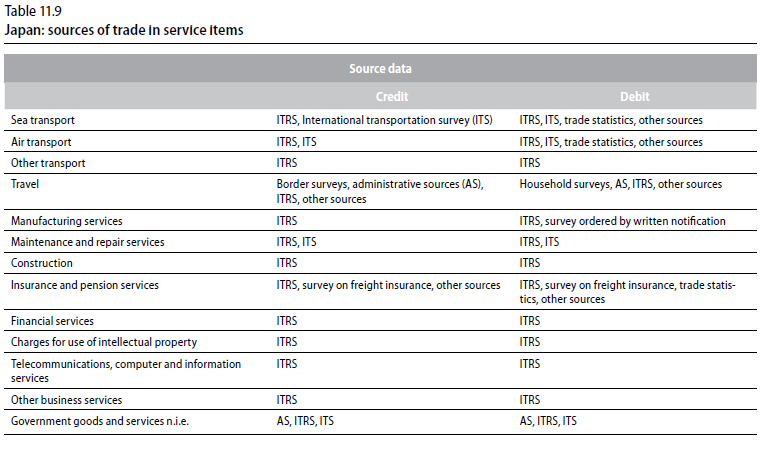Country experience: Japan
11.40. Japan uses an ITRS as a primary data source for compiling trade in services. However, as some transactions cannot be captured through an ITRS, various data sources have been implemented to supplement it. Other data sources include enterprise surveys for specific business based on the Foreign Exchange and Foreign Trade Act, administrative sources and data provided by private institutions. Uses of data sources other than the ITRS for the compilation of trade in services are summarized in table 11.9. More detail on the experience of Japan is given in the online version of the present Guide.
Table 11.9 Japan: sources of trade in service items
...
Source data
...
Credit
...
Debit
...
Sea transport
...
ITRS, International transportation survey (ITS)
...
ITRS, ITS, trade statistics, other sources
...
Air transport
...
ITRS, ITS
...
ITRS, ITS, trade statistics, other sources
...
Other transport
...
ITRS
...
ITRS
...
Travel
...
Border surveys, administrative sources (AS), ITRS, other sources
...
Household surveys, AS, ITRS, other sources
...
Manufacturing services
...
ITRS
...
ITRS, survey ordered by written notification
...
Maintenance and repair services
...
ITRS, ITS
...
ITRS, ITS
...
Construction
...
ITRS
...
ITRS
...
Insurance and pension services
...
ITRS, survey on freight insurance, other sources
...
ITRS, survey on freight insurance, trade statistics, other sources
...
Financial services
...
ITRS
...
ITRS
...
Charges for use of intellectual property
...
ITRS
...
ITRS
...
Telecommunications, computer and information services
...
ITRS
...
ITRS
...
Other business services
...
ITRS
...
ITRS
...
Government goods and services n.i.e.
...
AS, ITRS, ITS
...
AS, ITRS, ITS
Country experience: Philippines
11.41. Bangko Sentral ng Pilipinas (BSP) is the lead agency in the compilation of statistics on the international supply of services in the Philippines. BSP is able to compile all the main services accounts, mostly from the bank reports in the ITRS, supported by the company responses to the cross-border transactions surveys (CBTS) and administrative reports from other agencies and industry associations.
11.42. The main challenge for BSP in the compilation of statistics on the international supply of services is maximizing the benefits of the ITRS and CBTS. On the one hand, the challenge of BSP in the use of an ITRS is addressing possible misclassification of transactions by banks. On the other hand, BSP is confronted with the challenge of improving the generally low response rate and the coverage of CBTS to include other industries, to better capture relevant international services transactions. The low response rate of surveys stems from the absence of a specific provision in the charter of BSP that would allow it to enforce compliance by non-financial corporations to provide data or information.
11.43. Reports submitted to BSP by commercial, thrift and foreign banks under ITRS contain information on bank positions in foreign currency-denominated assets and liabilities and all payments and receipts that bring about changes in the banks’ positions. That information is being used in the compilation of some services sub-items, such as transport, travel, construction, insurance and pension, financial (including FISIM), charges for the use of intellectual property n.i.e., telecommunications, computer and information services, other business services and personal, cultural and recreational services.
11.44. In addition to the monthly CBTS, BSP, in coordination with the department of trade and industry (DTI) also conducts the annual information technology-business process outsourcing (IT-BPO) services survey that covers companies engaged in business process outsourcing (BPO) activities.
11.45. BSP also uses administrative data provided by regulatory and administrative government agencies, such as customs data, to compile some of the services sub-accounts, including manufacturing services of the physical inputs owned by others, freight import and exports, insurance etc.). The department of foreign affairs (DFA) data on the annual budgets of Philippine embassies and consular offices abroad are used as approximations for payments on government goods and services n.i.e.
11.46. For non-resident expenditure in the Philippines (travel receipts), data are derived from the visitors sample survey (VSS) conducted by the Department of Tourism (DOT), which provides information on the average expenditure of foreign tourists and their average length of stay in the Philippines. For tourist-related travel expenditure abroad by residents, data are sourced from the ITRS and CBTS. Beginning with the 1999 report, travel receipts include the expenditure of non-resident overseas Filipinos (OF) in the Philippines during home visits. Travel debits cover expenditures of resident OFs in the host countries in which they are deployed. Information on residents’ credit card expenditures abroad are obtained via reports of the Credit Card Association of the Philippines.
[1] The reason for this is that, in line with BPM6 recommendations (para 10.78), all freight costs up to the customs frontier of the economy of the exporter are shown as incurred by the exporter and all freight costs beyond the customs frontier of the exporter are shown as incurred by the importer (see chapter 14 and BPM6 Compilation Guide, para. 12.35).
...
